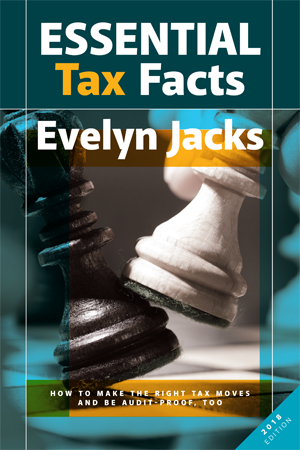
Educate Your Clients: Six Essential Tax Tips for 2019
Share the gift of education with your clients this holiday season! By discussing the six essential tax tips your clients need to know for 2019 and beyond, you can help Canadians become more informed on the tax-efficient decisions that will improve their financial health in the new year.
KBR’s top tax tips have been excerpted from Essential Tax Facts: How to Make the Right Moves and Be Audit-Proof, Too, which has been fully updated with the information your clients need to know when filing their 2018 taxes. Author Evelyn  Jacks says, “It’s the obligation of every taxpayer to know and follow the tax rules, and keep records to back up claims. These Essential Tax Facts have been written to empower Canadians in their often frustrating relationships with CRA—which are for life, by the way—so that they can keep more of their hard-earned dollars working for their financial future.”
Jacks says, “It’s the obligation of every taxpayer to know and follow the tax rules, and keep records to back up claims. These Essential Tax Facts have been written to empower Canadians in their often frustrating relationships with CRA—which are for life, by the way—so that they can keep more of their hard-earned dollars working for their financial future.”
Share these tax tips with your clients to help you make the right tax moves for their households and be audit-proof, too. The complete book also makes a great Christmas gift.”
- All taxpayers should file by April 30. The filing due date is April 30 for individual returns and June 15 for those who file returns to report sole-proprietorship income or expenses. However, if proprietors owe money to the CRA, the interest clock starts ticking the day after the April 30 tax filing due date, just like for other taxpayers.
- It pays to have a tax pro. The burden of proof for the numbers on your return is always on you, even if CRA has made a mistake; therefore, it is important to establish a relationship with a competent professional you can call on, should you have sudden trouble with the CRA. More common, your tax pro can help you with administrative issues that hold up your tax refunds, adjustment requests or to prepare for a tax audit.
- Do a “tax-360.” Most people are not aware of their “carry-over” opportunities; that is, the potential to use certain tax provisions in previous or future tax returns to offset taxes payable. Be sure to review past returns and take future tax planning into account rather than focusing on only the year at hand.
- Selling a tax-exempt principal residence? You will need to know about a new requirement when you file your T1 tax return: you must file Form T2091 Designation of Property as a Principal Residence by an Individual to report that principal residence disposition starting in 2017. Failing to do so can attract a penalty of up to $8000.
- Claim foreign tax credits. Where income is taxed in more than one country, tax treaties ensure that credit is given in the country of residence for taxes paid to the foreign jurisdiction. If you were subject to taxes in a foreign country, be sure to claim a foreign tax credit on your Canadian return.
- Departure taxes. Emigrants from Canada must file a “final return” to which a departure tax will be applied to the capital gains resulting from any increase in value of taxable assets, as of the date of departure. This is reversible if you decide to return to Canada in the future, so keep all your records.
Next week: essential tax moves and audit-busters for 2019 and beyond
Evelyn Jacks is Canada’s most trusted educator in the tax and financial services. Founder and President of Knowledge Bureau and developer of the Real Wealth Management discipline, she is also the author of 53 books.
Additional educational resources: Order your copy of Essential Tax Facts online with free shipping! Knowledge Bureau’s online tax courses for beginners are also suitable for taxpayers looking to become better informed on Canada’s complex income tax system.
COPYRIGHT OWNED BY KNOWLEDGE BUREAU INC., 2018.
UNAUTHORIZED REPRODUCTION, IN WHOLE OR IN PART, IS PROHIBITED.





